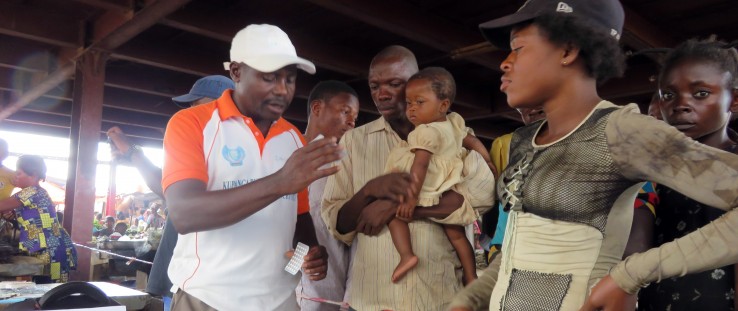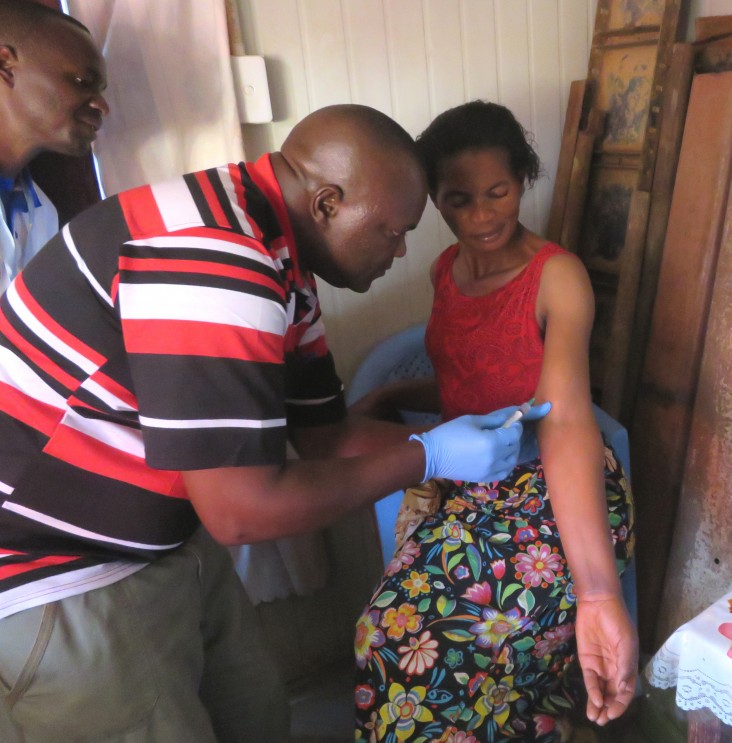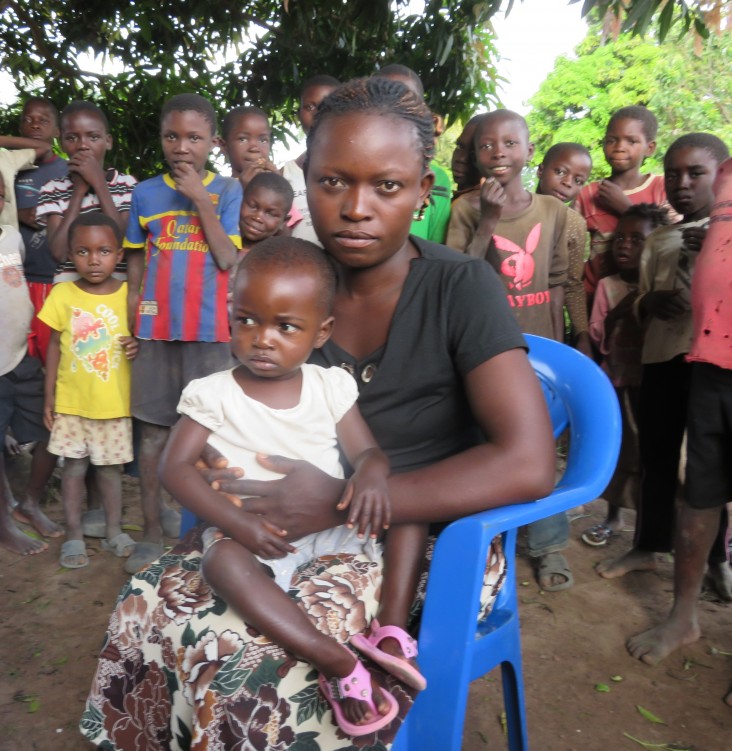 A community-based distributor provides family planning information at the Fungurume Central Market.
Laurel Lundstrom, Evidence to Action
A community-based distributor provides family planning information at the Fungurume Central Market.
Laurel Lundstrom, Evidence to Action
 A community-based distributor provides family planning information at the Fungurume Central Market.
Laurel Lundstrom, Evidence to Action
A community-based distributor provides family planning information at the Fungurume Central Market.
Laurel Lundstrom, Evidence to Action
Speeches Shim
On any given day, Fungurume Central Market in the Democratic Republic of Congo (DRC) is filled with women and men, young and old, shopping and selling—bright green cassava leaves, flours of different weights and hues, dried fish and fresh eggs. On one particular day in late March, the crowds were at the market not only for Congolese commerce, but for something entirely new: to learn about contraceptives and, for some, to pick up a contraceptive of choice for free.
“I decided with my husband to take an implant today,” said 44-year-old Veronique Kabadi, a mother of six who received her contraceptive implant in a temporary clinic set up at the back of Fungurume market in DRC’s Lualaba province. “Because of the number of children we have and our household income, we cannot support the children.”
Kabadi is like many women in DRC, who, without ready access to family planning services, has continued to give birth, despite extremely limited economic means to support a large family, and a desire to stop having children. According to a 2014 survey, women in DRC have an average of six to seven children in their lifetimes. Very few women use modern contraception: 8 percent of women in the entire country and as little as 4 to 5 percent of women in rural areas, including Lualaba.
A community-based distributor counseled Kabadi and her husband on the healthy timing and spacing of pregnancies and family planning, and told them that a full range of contraceptives would be available at Fungurume market. Since Kabadi was already planning to be at the market to sell her crops, she added in a stop at the temporary clinic at the back of the market to have her implant inserted, which prevents pregnancy for up to five years.
Both the community-based distributor and the contraceptives at Fungurume market are part of a USAID/DRC community-based family planning project that operates in 51 health areas in three provinces—Lualaba, Kasai Central and Lomami. Started in May 2015, the initiative seeks to significantly increase rural populations’ access to high-quality family planning services—specifically by shrinking the distance people have to travel to obtain contraception.
Before the project began, people living in the 51 health areas had no access to contraceptives close to home. Instead, they had to travel to a health center, often at a great distance from where they lived.
Contraception Close to Home
Outreach events, like the one where Kabadi received her implant, are held twice a month in public spaces where communities frequently gather. Eight community-based distributors work at the events, leading group discussions about family planning, and counseling women and men.
They work to ensure that participants make informed choices about all available contraceptive methods: implants, injectables, male and female condoms, contraceptive pills and CycleBeads that aid in tracking natural birth control. Community-based distributors provide condoms, pills and CycleBeads, and refer anyone who wants additional contraceptive counseling, or is considering an implant or injectable, to a temporary clinic set up for the event.
- Outreach events are held twice a month in 51 health areas
- 1,400 community agents provide information and encourage use of contraception
- 408 health volunteers work as community-based distributors of family planning and child health services
- 102 nurses provide counseling and administer clinical family planning methods
- 50 health officials offer supervision and support, and planning for sustainability
The clinic is a confidential space staffed by two nurses from the nearest health center. Before they begin, the nurses counsel clients about their preferred method, including potential side effects. The nurses can also remove implants for women who request it.
Back in March at the Fungurume market, 355 people took advantage of the family planning services. Nurses inserted 11 implants and administered two injectables, and community-based distributors gave out 107 CycleBeads, 28 female condoms, 114 male condoms, and 93 oral contraceptive pill packs.
At $60 per outreach, the events are a cost-effective way to provide family planning services, making them an attractive approach to deliver free contraceptives to rural communities well into the future.
“Outreach events, where nurses from public health facilities administer long-acting contraceptives, like implants, are one of the most sustainable and cost-effective means of addressing the equity gap to full contraceptive choice in settings like DRC and other developing countries where the policy environment is not yet supportive of task-sharing strategies that move clinical services to the community level,” said Murtala Mai, director of a USAID mission-supported program with the Evidence to Action Project, which implements the community-based initiative. “The innovative coupling of routine community-based distribution with regular outreaches by clinical nurses is already showing promising results in terms of high demand and uptake of contraception.”
Reaching the “Hard to Reach”
“I want to stop having children. Seven is enough,” said Mwenze Banza, 33, who was at an outreach event at a park in Mutshatsha to receive a contraceptive for the first time in her life.
Mutshatsha is an extremely rural area situated more than 150 kilometers up a rough, red-dirt road from Fungurume. Poor roads and infrastructure across DRC, a country that spans almost 2.5 million square kilometers, are a major challenge to delivering health services to rural areas like Mutshatsha.
“Women in Mutshatsha are very happy to see the [contraceptive] methods in this community so household incomes can improve,” said Banza.
Men, too, are enthusiastic about finally having access to family planning services.
“It is important to get information on family planning,” said Patient Kahumba, 23, of Mutshatsha. “Last month, I accepted to get condoms because this is another way to protect myself against HIV and to avoid pregnancies.”
Community-based distributors explain that their communities are eager for family planning.
“Women were asking us questions: ‘Where were you? Why weren’t you coming before?’” said Koniki Upite, a community-based distributor and one of the few women who serve as president of a health development committee in Lualaba province. Health development committees determine what health issues should be a priority focus in their communities.
A woman at the community outreach event in Mutshatsha echoed that sentiment.
“Where was your project before?” asked Maurine Tshinngo Mwinza, 24, who was at the park to refill her supply of oral contraceptive pills. “I wouldn’t be an unmarried mother with two children right now if I had had contraceptives.”




Comment
Make a general inquiry or suggest an improvement.